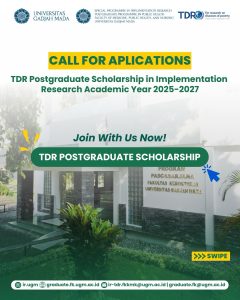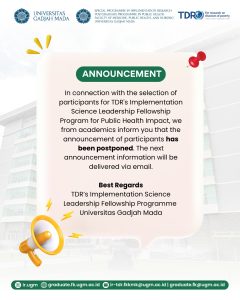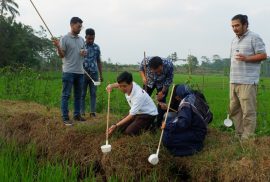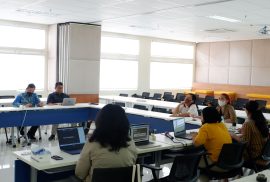
Call for Applications
TDR Postgraduate Scholarship in Implementation Research
Academic Year 2025-2027
Extended Deadline for Application : 30 April 2025
Description
Faculty of Medicine, Public Health and Nursing, Universitas Gadjah Mada (UGM) of Yogyakarta, Indonesia, invites suitably qualified candidates to apply for a place in the following full-time postgraduate programme, with a focus on implementation research (IR) for the 2025-2027 Academic Year.
Funding for these full scholarships is from TDR, the Special Programme for Research and Training in Tropical Diseases, based at the World Health Organization in Geneva. Only applicants from low- and middle-income countries of WHO South-East Asia and Western Pacific Regions are eligible.
The scheme focuses on building capacity on IR to address four major global health challenges affecting infectious diseases of poverty using a One Health approach: epidemics and outbreaks; control and elimination of disease of poverty; climate change’s impact on health; and resistance to treatment and control agents.
Those with research experience in implementation research on the above-mentioned areas will be prioritized during the selection process. A limited number of scholarships will be offered for the 2025-2027 academic year in the International Master Programme in Public Health, leading to an MPH degree (2 years duration). The programme is taught in English.
Study Areas
As a part of the MPH, the postgraduate training will comprise modules relevant to a career in IR, a growing field that supports the identification of health system bottlenecks and approaches to addressing them. It is particularly useful in LMICs, where many health interventions do not reach those who could be benefitting from them. The goal of this training scheme is to strengthen the capacity of researchers to gather evidence-based knowledge using sound methodology to incorporate into policies and practices in LMICs.
Further information on implementation research is available from the TDR website .
Scholarship recipients will be enrolled as postgraduate students and conduct their thesis on IR on infectious diseases of poverty with a major focus on epidemics and outbreaks; control and elimination of disease of poverty; climate change’s impact on health; or resistance to treatment and control agents.
The scholarship recipients will have the opportunity to join the global prestigious alumni platform IR Connect, which would monitor the impact of the training programme on their career and allow them to network with other alumni for further career opportunities.
Eligibility for the Scholarship
Applicants should:
- Be nationals of, and residents in, low- and middle-income countries (as defined by the World Bank) of WHO South-East Asia region and Western Pacific Region
- Be under 37 years of age at the time of application for the Master program
- Meet the University requirements for international postgraduate students
- Meet the academic requirements:
- A bachelor’s degree with a cumulative Grade Point Average of at least 3.00 out of 4
- AcEPT score of at least 268 or TOEFL score of at least 550 or IELTS score of at least 5
- Desk evaluation on undergraduate academic documents
- Be able to identify a local supervisor or mentor before the commencement of the programme
- Be interested in developing a career in IR on infectious diseases of poverty, including neglected tropical diseases
- Consent to meet health requirements in line with regulations of the Indonesian government and UGM
- Be an employee of an academic or research institution, not for profit organization, or ministry of health or its agencies in an LMIC of the WHO South-East Asia region and Western Pacific Region.
The final selection of candidates will be done in conjunction with TDR, considering gender and geographic representation of candidates from the regions.
Equity
TDR is committed to promoting equality, equity, diversity, and inclusivity in science. Researchers are encouraged to apply regardless of gender identity, sexual orientation, ethnicity, religion, cultural and social background, or (dis)ability status.
The Scholarship Covers
- One return economy airfare between the home country of the student and Yogyakarta, Indonesia;
- Tuition fees and a basic medical and accident insurance;
- Support for research project/thesis expenses, including travel and sustenance during data collection in home country;
- Indonesian language course to improve integration in the university’s environment; and
- Monthly stipend to cover living expenses equivalent to local living
Applying for the TDR Postgraduate Scholarship Scheme
To apply for a TDR Postgraduate Scholarship, you must complete the following two steps:
Step 1: Apply for the Master’s Program
- For International Applicants:
- Please log in or sign up at https://admission.ugm.ac.id/and select “Master’s Degree Program Odd Semester 2025/2026_Scholarship [WHO-TDR,DCSE Global Talent]“ for the Master of Public Health program.
- After submitting your application, please send high-quality copies of all uploaded documents to
ir-tdr.fkkmk@ugm.ac.id and cc: graduate.fk@ugm.ac.id.
- For Indonesian Applicants:
- Please complete the application form and fulfil the requirements listed on um.ugm.ac.id
- Submit your application and supporting documents to ir-tdr.fkkmk@ugm.ac.id and cc: graduate.fk@ugm.ac.id
- Ensure that your motivation letter and scholarship application form are written in English.
Step 2: Apply for the TDR Postgraduate Scholarship
- Complete the TDR Postgraduate Scholarship Application Form (attached).
- Send the completed form to ir-tdr.fkkmk@ugm.ac.id and cc: graduate.fk@ugm.ac.id.
Only completed forms will be further processed.
Application and Selection Process
All candidates are required to apply online for the MPH Programme. Once the online application has been completed, it will be reviewed based on MPH programme requirements. If all requirements are met, candidates will be contacted for assessment for the MPH programme through a virtual interview with a panel of experts. Qualifications will be reviewed based on TDR Scholarship requirements. The final approval of this scholarship and placement of students will depend on the candidate’s assessment result and other criteria relevant to the MPH programme and scholarship. Finally, selected candidates will be required to confirm acceptance of the offer by submitting an acceptance letter, as per Universitas Gadjah Mada requirements.
Timelines
| Call for applications | 11 February 2025 |
| Extended Deadline for applications submission | 30 April 2025 |
| Announcement of selection result | June 2025 |
| Academic program commencement | Mid-August 2025 |
Selected applicants will receive a letter of offer from the University and have 3 calendar days to confirm acceptance after the notification. Faculty of Medicine, Public Health and Nursing, UGM reserve the right to refuse or end attribution of the scholarship if the provided information has been proven false.
INFORMATION
For more information on the scheme at Faculty of Medicine, Public Health and Nursing, UGM, please contact:
Ms. Yuyun Yohana
The Graduate Programme Office
Faculty of Medicine, Public Health and Nursing,
UGM Mobile Phone (WhatsApp): +62 811-2574-447
E-mail: ir-tdr.fkkmk@ugm.ac.id | graduate.fk@ugm.ac.id
Website: http://graduate.fk.ugm.ac.id/
DOWNLOAD Application Form











